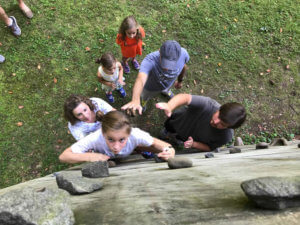Your Camper’s Safety Is Our #1 Priority Right from the Beginning
 Staff review and follow set policies, procedures and practices in order to meet the highest level of safety in all camp activities. Our policies have been informed by the best camp professionals in the nation, and comply with the stringent standards of the American Camp Association. Professionals on the LCC Board of Directors, committees, and task forces assist staff with frequent review and necessary revision of policies and practice.
Staff review and follow set policies, procedures and practices in order to meet the highest level of safety in all camp activities. Our policies have been informed by the best camp professionals in the nation, and comply with the stringent standards of the American Camp Association. Professionals on the LCC Board of Directors, committees, and task forces assist staff with frequent review and necessary revision of policies and practice.- All Kirchenwald and Nawakwa staff, paid and volunteer) are carefully screened, undergo a thorough interview, reference checks, and background checks as required by the Commonwealth of PA. Our resident staff receive two weeks or more of on-site training before campers arrive. Volunteer adult staff are utilized in limited and specific roles, and always serve alongside resident staff.
- The nurse or health officer keeps the camper health forms, medicine, and a stocked first aid cabinet. We review every camper’s health form and screen for any potential problems when the camper arrives at camp. Once campers arrive, we check for any health updates or issues. All medications are kept in locked storage in the health center and are dispensed by the health officer or designated leadership staff.
- Staff are certified in American Red Cross first aid and CPR; aquatics staff are all certified lifeguards.
- Staff are instructed to never be alone with a camper.
- Campers are instructed about rules for safety at the very start of camp. Upon arriving to camp, campers are instructed that they must always travel in groups, and may not leave the group without letting their counselor know. All staff review and practice specific procedures for possible emergency scenarios including lightning, fire, wildlife, lost camper and intruder in camp. Campers are informed of areas of camp which are off-limits. Weather related alterations and modifications are implemented to ensure camper safety.
- Campers use a buddy system when moving through camp. Our programs are small group-based, meaning that groups move through the week as a unit, reducing the opportunity for campers to become separated from the group.
- Staff carry cell phones on out-of-camp trips for quick communication or in case of an emergency. Staff are trained in the various methods of intra-camp communications (phones, bells, runners).
- Drivers of vehicles transporting campers are 21 years of age or older, have a verified clean driving record, and have experience driving the type of vehicle being used.
- Campers and camp staff wear protective safety equipment during activities. We wear activity specific helmets for cycling, climbing, zip-lining, kayaking, caving, and horseback riding.
- Our ropes courses meet and are up to date with Association of Challenge Course Technology standards. High ropes facilitators have completed required safety training. During these activities, an experienced staff member will give thorough safety talks and follow proper safety procedures for each activity.
- We supervise and teach campers how to properly use all equipment to avoid any potential injuries associated with everyday camp life.
- Our facilities and outdoor equipment are tested, maintained, and annually certified.
- Campers must pass a swim check before open swim time to determine their strength as a swimmer. Non-swimmers must remain in shallow areas. Life jackets are required for all boating activities.
- Food served at camp always includes fruits and vegetables and alternatives can be provided in case of food allergies. Campers’ food allergies are communicated to the counselors and food service staff by the nurse or health officer. Isolation (i.e. a peanut-free table) and separate cleaning of utensils is available at the camper family’s request.

